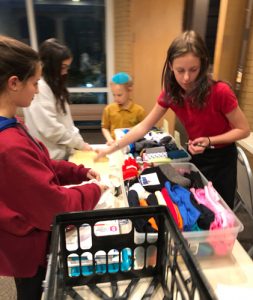
Right down the road from Ruth Newstock’s home in Memphis, Tennessee, a nearby church opens its doors every Tuesday night during the winter months so those who are homeless can have a hot meal and warm place to sleep. Given her cheery, friendly personality, it’s no surprise that when a friend asked Ruth if she wanted to volunteer one evening, she quickly accepted the offer.
At that time, as a soon-to-be 12 year old, it was nearly impossible for Ruth to imagine who she would meet. “I knew there were people in our community who were homeless, but I couldn’t believe there were people just like me who didn’t have a bed to sleep in,” she says. “I was able to play with some of the kids who were there for the evening. One of the kids loved going on elevators, so we went up and down a bunch of times.”
For Ruth, the experience late last year was a chance to ask herself—and her synagogue, Beth Sholom, “Why can’t we do this?” With her Bat Mitzvah fast approaching, she could think of no better way to make an impact on her community than to tailor her upcoming mitzvah project to serve those in need. “I really liked deciding on this project because I would actually get to meet the people I was helping,” Ruth says. “Instead of just sending donations somewhere, I’d be the one who was receiving them.”
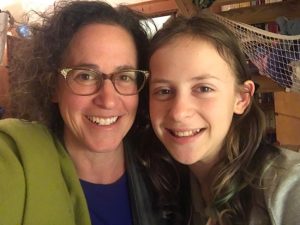
With a 19.4 percent poverty rate and many who are on the verge of homelessness, there is a great need for assistance in Memphis, according to Ruth’s mother, Sarah. “We see people struggling on a regular basis here,” she says. “Over the years, Ruth and I have had many conversations on how to help those in need and to us, this was one of those meaningful ways to do it. The message is very clear in Judaism to take care of the strangers among us.”
Ruth and Sarah quickly went to work with the synagogue’s Tikkun Olam committee to answer any questions the congregation had and prepare a proposal for the synagogue board. “Ruth really had to do her homework,” Sarah says. “She had to figure out what supplies to get, decide what the budget would be and list out any possible liabilities. There was a lot of work on the front end, which made it easy for the community to get fully on board.”
The synagogue teamed up with Room in the Inn, a non-denominational faith-based program that provides emergency shelter and meals during the coldest months of the year to become the first synagogue in Memphis to open its doors to the homeless. Program participants meet with a Room in the Inn volunteer or employee and are then taken to a nearby site where they are given dinner, a place to sleep for the night and breakfast the next morning. Following breakfast, the organization drives them back downtown.
While discussing her proposal with the board, Ruth referenced Isaiah 58:7, which speaks about sharing food with the hungry and providing the poor with shelter and clothes. She even wrote a message on the Beth Sholom website to get the word out to the community. Once the proposal to host six to eight women or children three times in the winter of 2019 was approved by the board, Ruth began mapping out roles for everyone who volunteered to take part in the synagogue’s first event in early January. “Ruth had to figure out who would be responsible for the laundry, cleaning and cooking,” Sarah says. “There was also a separate fund created at our synagogue for Room in the Inn, so Ruth received a lot of Bat Mitzvah gifts toward the fund.”
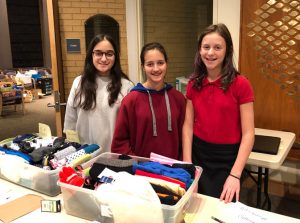
Because Beth Sholom is strictly kosher, all food for the dinners, which include hamburgers, hot dogs, side dishes and dessert, had to be created and prepared at the synagogue. To help garner funds for the meals, Ruth and the team had to get creative. “We proposed for it to be a community meal where the congregation could pay to reserve their spot at the cookout and then eat with our guests, or they could donate so that if they couldn’t make it, they could provide a meal for someone else,” she says.
The opportunity for Ruth to sit and talk with guests and hear their stories during the synagogue’s first hosted event on January 10th was truly impactful. “It was amazing and I was so happy that people were thankful for us being able to help them,” she says. “In Hebrew school, we talked a lot about the importance of doing a mitzvah project, so to really see everyone’s work pay off was great.”
For Rabbi Sarit Horowitz, the opportunity to feed and shelter the less fortunate not only showed the power of coming together, but also the strength of the Jewish community to give back. “We knew that for this to happen, we would need to be successful in cultivating a large volunteer base,” Rabbi Horowitz says. “This was Ruth’s idea all along and it came to fruition because of many congregants’ desire to support the program, donate their time and money and be a part of this effort. Our tradition compels us to reach out and create opportunities of embracement even to those we don’t know. Overall, it’s been a beautiful community-building project.”
“We are proud of all of our B’nai Mitzvah students when they take on mitzvah projects because it develops their own sense of religious identity and understanding and what it means to be a Jewish adult,” Rabbi Horowitz continues. “Ruth is one such example—she is making an impact on our synagogue community and the broader Memphis community, and the entire Beth Sholom family is very proud of her.”
To make a donation or send supplies for the final Beth Sholom hosting event in March, click here.
Another Synagogue Helping the Homeless
All around the country, synagogues are making a difference in the fight against homelessness. One example is Congregation Beth David in Saratoga, California. It recently joined with Prince of Peace Lutheran Church to be a hosting community for the Rotating Safe Car Park program, a solution that offers safe parking at local synagogues and churches for people forced to live in their cars due to the local housing crisis.
“The program is critical because local ordinances prohibit sleeping in parked cars overnight, which creates constant conflict between those in their cars and the local police,” says Rivka Shenhav, Congregation Beth David’s homeless shelter coordinator. “Approved guests—who are screened by a local case management organization—not only receive a safe and quiet parking spot for the night, but also access to bathrooms and hospitality services such as a place to charge their devices, snacks and space to lounge for an hour or two in the evening and morning.”
Congregation Beth David is no stranger to helping the less fortunate. For several years, the synagogue worked with the Faith in Action Rotating Shelter to serve hot meals, provide groceries and more several times a year to those in the homeless community who were working to get back on their feet and transition to more permanent housing.
“Helping the less fortunate in our community is not only a matter of a mitzvah,” Rivka says. “It also brings to the light a community that is an organic part of our fabric of life, but is mostly invisible to us. The greatest benefit to me from participating in these programs has been the opportunity to work with various organizations and meet enormously kind and generous people. It has been a deeply humbling experience that challenges both me and our congregation to match their kindness and caring.”
Like this article? Sign up to receive Journeys in your inbox each month »
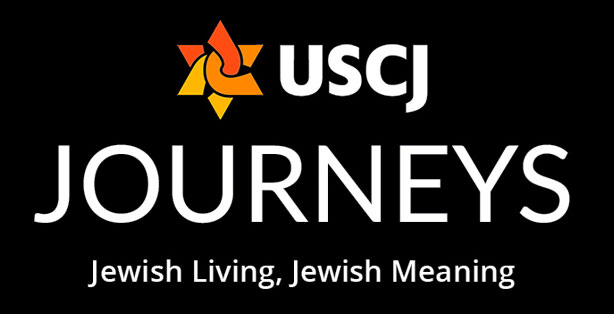
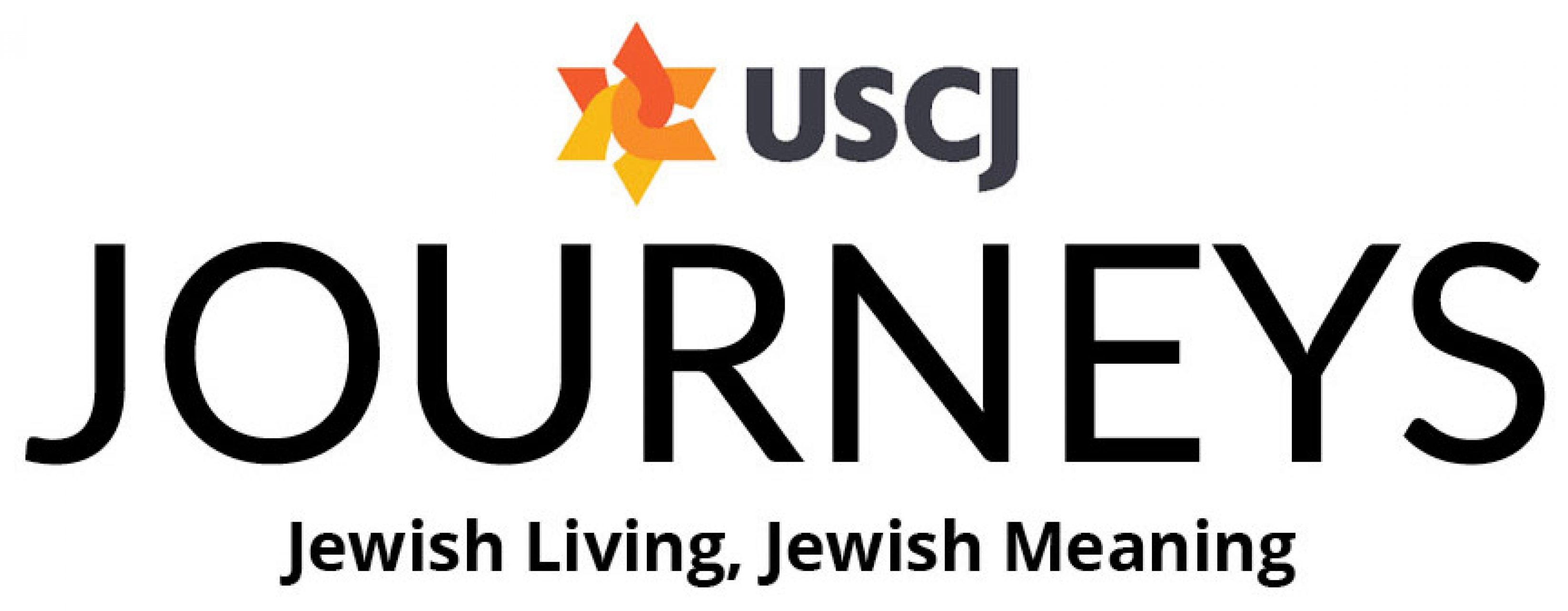
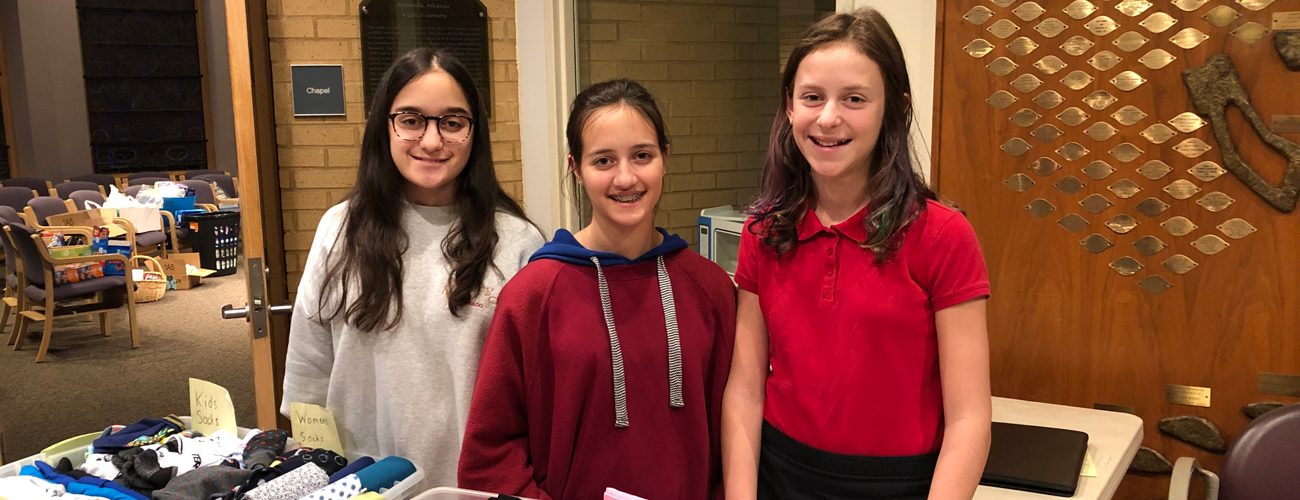


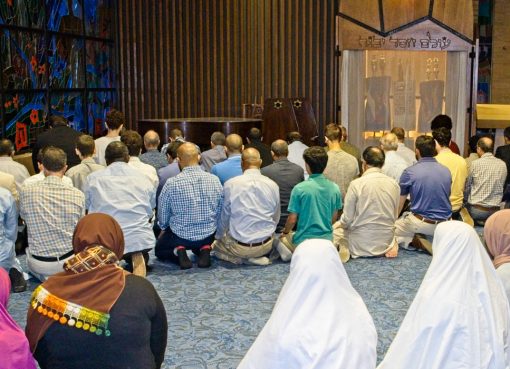
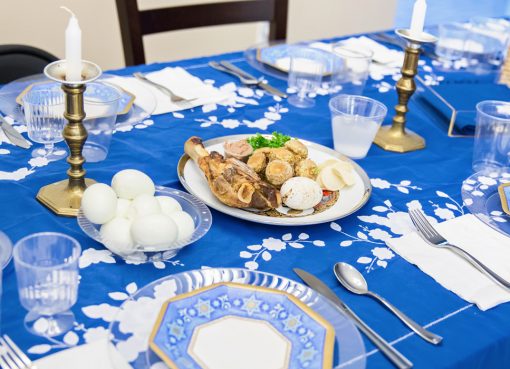

Comment here